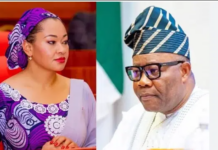Financial Times tears into Tinubu, asks him to stop theft of public funds and focus on developing Nigeria
By Jeph Ajobaju, Chief Copy Editor
*****************************
“Corruption needs to be tackled. It does not help that Tinubu’s own vast wealth is not easy to decipher, nor that his poverty minister was suspended for alleged diversion of funds, something she denies.
“It does not help either that the state is implicated in the wholesale theft of oil, depriving the nation’s coffers of billions of dollars. Tinubu should use all his political guile to staunch the flow.
“If the [Nigerian] economy is to be revived, the state needs to be an enabler. It must provide power, roads, security and justice, not to mention schools, hospitals and support for the poorest in society.
“Without a properly joined-up and articulated plan, Tinubu’s bitter medicine will not cure Nigeria’s ills. It will just leave a bad taste” – Financial Times editorial
*****************************
A foreign entity has reminded Bola Tinubu of how bad the Nigerian economy has sunk and what he needs to do to revive it, by plugging corruption, oil theft, and use his position as President to lead by good example – rather than lying to fellow citizens and carry on as if nothing is happening while the country burns.
Financial Times, the respected and influential newspaper published in London, listed in an editorial several ways Tinubu has failed since he occupied the seat in Aso Rock, catering to and protecting his gang in the ruling class, while poor Nigerians can hardly breathe.
The newspaper also listed several steps the man can take to tackle the problems, if he is sincere, just as Nigerians themselves have told him loud and clear over these past months.
The New York Times on June 11 wrote a similar article on the Nigerian economy which, as usual, was rubbished by Tinubu’s spokesman Bayo Onanuga who attacked the newspaper and failed to use facts to deal with the facts presented in the report.
The Financial Times editorial is reproduced below:
Tinubu forces 220m citizens to swallow bitter medicine without positive result
In the nearly 15 months since Bola Tinubu became president, he has forced his 220 million fellow Nigerians to swallow some bitter medicine.
He removed a generous fuel subsidy, one of the few benefits citizens receive from their inefficient and corrupt state. He allowed the country’s currency, the naira, to enter freefall, fuelling imported inflation and triggering the worst cost of living crisis in a generation.
These measures have pushed tens of millions of already impoverished people deeper into misery. But they were necessary to begin correcting the country’s long-term economic demise.
The fuel subsidy was ruinously expensive, guzzling nearly a third of the federal budget. It was also distortionary, channelling Nigerians’ energies into rent-seeking, smuggling and graft.
Why Nigerian elite prefer arbitrage to production
The exchange rate regime, which vastly overvalued the naira, wiped out exports of everything but oil. While genuine industries were starved of hard currency, cronies accessed cheap dollars to sell on the black market.
Nigeria’s elite learnt a lesson that was toxic to the nation’s prospects: why produce anything when you can make a killing through arbitrage?
Moving to more orthodox policies is vital to reset an economy that has not grown in per capita terms for a decade and where one of the most lucrative industries has been kidnapping.
“Tinubunomics” disjointed
It is necessary, but insufficient. “Tinubunomics” is so disjointed it barely deserves the name. Shock therapy will probably fail if important adjustments are not made.
First, the president must chart a course ahead and convince Nigerians they are in it together. For that to be remotely credible, the political class must make sacrifices.
Out must go lavish pay rises for civil servants and flashy cars (not to mention jets) for government officials. Tinubu only has to look at Kenya, where violent street demonstrations have forced the government to withdraw tax rises, to see what happens when a sense of injustice festers.
Likewise some savings from the fuel subsidy should be redeployed to support the most economically vulnerable as a priority. Hunger levels are soaring and millions of children are foregoing meals and school.
Nigerian politicians love to be seen handing out bags of rice. But what is needed is direct cash payments to people’s phones, the technology for which exists, and in the longer-term a proper safety net.
As things stand, the state lacks either the capacity or the probity to administer such a scheme. Tinubu needs to fix that urgently. With a few exceptions, his cabinet is full of lightweights who owe their jobs to political patronage, not to expertise. Technocratic talent exists in abundance. It must be marshalled.
Source of Tinubu’s vast wealth unknown, fuelling corruption
Corruption needs to be tackled. It does not help that Tinubu’s own vast wealth is not easy to decipher, nor that his poverty minister was suspended for alleged diversion of funds, something she denies.
It does not help either that the state is implicated in the wholesale theft of oil, depriving the nation’s coffers of billions of dollars. Tinubu should use all his political guile to staunch the flow.
Some will argue that Nigeria’s state is so weak all Tinubu can do is remove its influence and retreat. Nigeria collects tax worth about 10 per cent of gross domestic product, one of the lowest rates in the world. That is a sure sign of how little trust exists between the government and the governed.
But if the economy is to be revived, the state needs to be an enabler. It must provide power, roads, security and justice, not to mention schools, hospitals and support for the poorest in society.
Without a properly joined-up and articulated plan, Tinubu’s bitter medicine will not cure Nigeria’s ills. It will just leave a bad taste.
_________________________________________________________________
Related articles:
Tinubu in panic mode as youths plan countrywide hunger protest to give him the ‘Kenyan treatment’
Adesina warns against importing food, says it won’t solve Nigeria’s food insecurity
Cost of healthy food shoots up 110% amid nationwide hardship
Ndume says Tinubu “caged in the Villa,” and needs “to wake up” to the reality of national hardship
_________________________________________________________________














